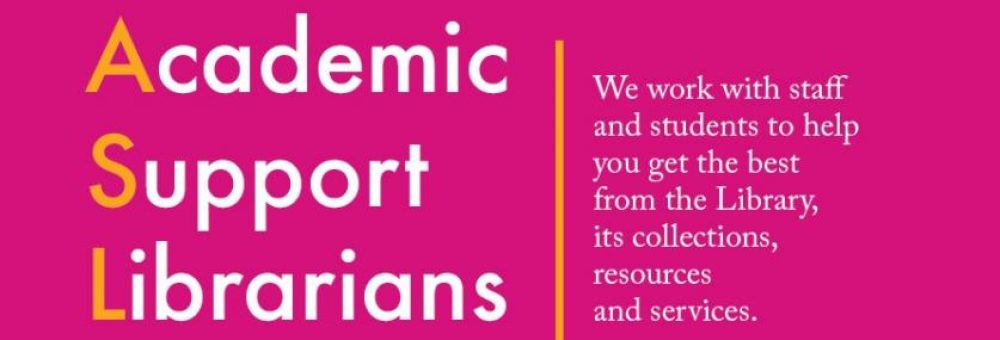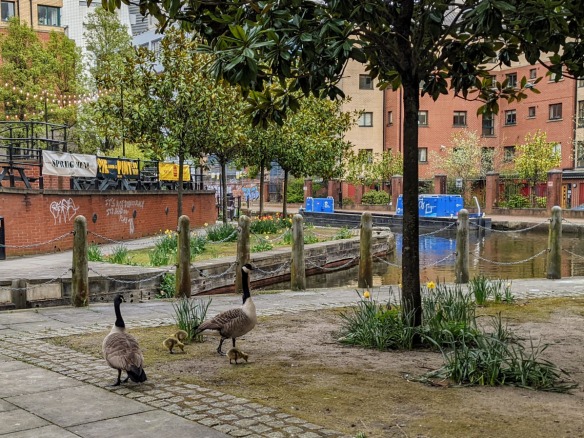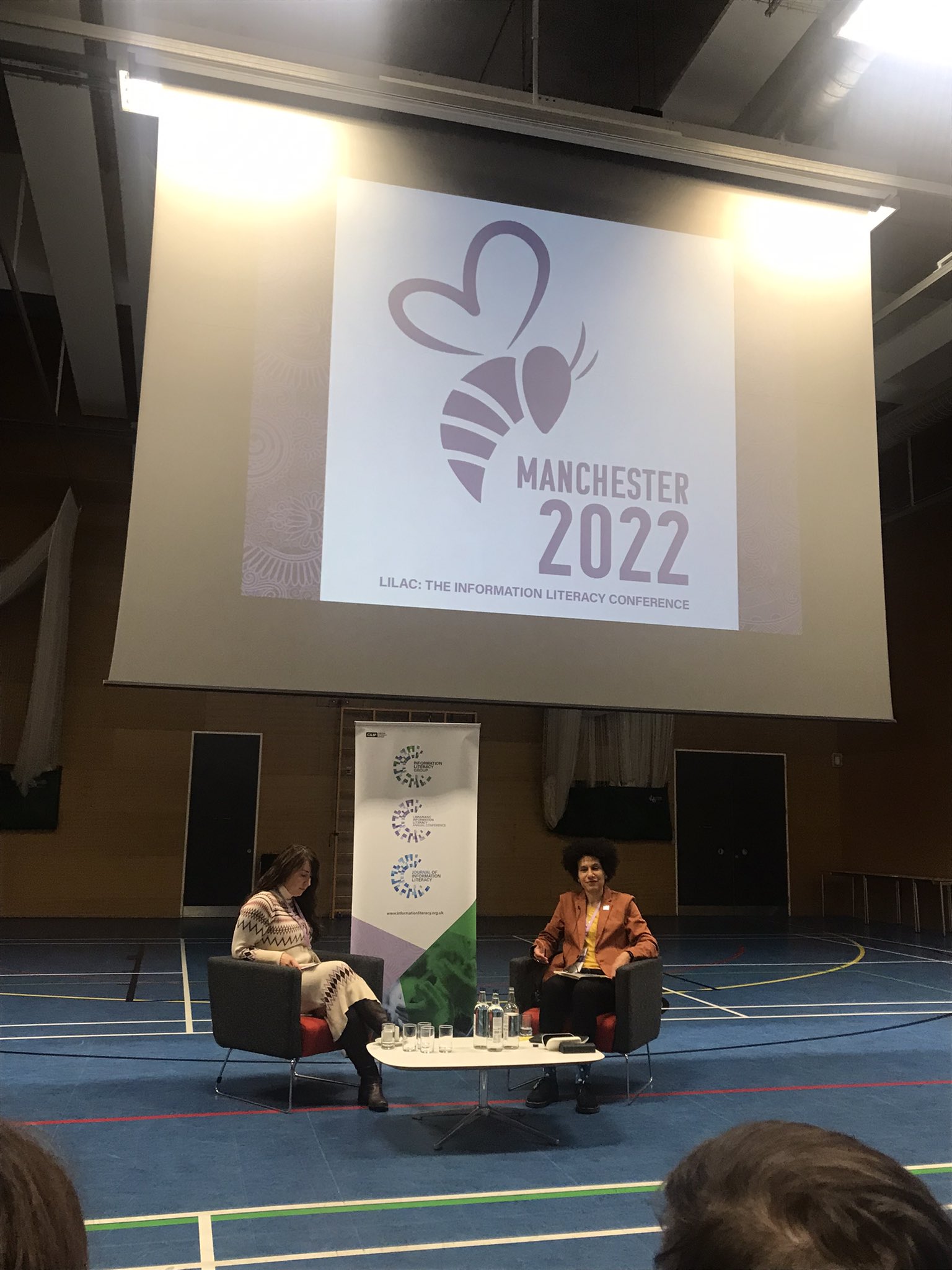Between 25-27 March a host of librarians from across the globe descended on Leeds Beckett University for the annual LILAC information literacy conference. Information literacy is a key concept in the work of the Academic Support Librarians, covering all the skills that we teach, from referencing through to critical thinking. Here are our key takeaways from three days of keynotes, workshops, and poster presentations.
AI, AI, and more AI
As you might imagine AI featured heavily across the conference. The keynote on the first day was framed as a Q&A between the audience and four information professionals on the topic “Artificial Intelligence and Information Literacy: Seismic Shift or Passing Fad?”. The discussion brought up some interesting ideas, including:
- AI as a chance for us to take information literacy teaching to a new level, as the bias within AI generated content and training data is the same biases present in the literary canon and the majority of academic and scientific content. It’s the same challenges but at a greater amount/speed and possibly people are more aware of it.
- We need to be aware of the “hype cycle” of AI adoption, acknowledge that we are all learning together about AI, and be more comfortable living in a messy world and working with others to find a way forward – we need to be able to adapt and apply the skills we learn to new things and we can apply the principles of information literacy to this new technology.
- AI can only be a great leveller if everyone is digitally literate. Should libraries subscribe to AI models to increase access for all students?
- It’s important to consider the context in which AI is being used and the existing digital skills of the students and staff using it. It may be necessary to establish a foundation of digital literacy skills first and then layer additional skills building up to using AI. Also, there may be significant disciplinary differences in ways of using AI, so support and guidance may need to be tailored.
- In response to a question about the potential of AI to disrupt traditional research practices, the power of AI to make sense of unstructured research data, e.g., transcribing audio data, translation and providing metadata summaries, was mentioned, along with the need to open up support structures in universities to enable AI specialists to train researchers. A good question to ask yourself: Are you using AI to help you work better or using it to cut corners? This is a key question (although not the only one) when considering whether use of AI is cheating or not.
Additional sessions on the first day also focussed on AI and information literacy and libraries. We heard from Emily Dott and Terry Charlton from the Library and the Learning and Teaching Development Service at Newcastle University who presented their work in developing the University’s approach to AI literacy. They spoke about the institutional AI journey over 2022 to 2024, including: growing awareness about the potential impact of AI on education; the launch of guidance resources; developing and running workshops; editing their existing information literacy framework to align with AI literacy; launching new resources; and planning future developments. They highlighted Newcastle’s principle-led approach to AI and work on developing collaborative models for working with academic staff and students and defining AI literacy alongside IL literacy. Guidance and learning materials for students and academic colleagues were also showcased, including the AI and Your Learning website and AI for Learning Canvas course.
Erin Nephin from Leeds Beckett University gave an overview of the Library Academic Team’s work over the last year in playing a key role in developing the University’s guidance and principles on AI. Erin outlined how the team have updated their academic integrity module and referencing guidance and developed sessions for professional services and academic staff. The collaborative nature of this work with colleagues in Academic Quality Enhancement, Academic Integrity Leads, the Centre for Teaching and Learning, Library and Student Services, and the Students’ Union Advice Services was emphasised.
Erin highlighted the University’s pragmatic view of AI technologies as here to stay and needing a user education that focusses on ethical and responsible use. The focus of information literacy (IL) teaching at Leeds Beckett is very much on how AI tools work, particularly in information IL contexts such as misinformation, privacy/IP, and ethics, rather than how to use them. The success of teaching and guidance has been largely measured through post-session feedback. Key impacts of the work so far have been in incorporating IL more overtly into all teaching sessions and materials, improving staff understanding of IL and AI, information sharing, and building collaborations. Erin also recommended several sources of support, including the JISC National Centre for AI, ALDinHE AI Forum and Community of Practice, ILFA AI Special Interest Group, and AI4LAM community. On the Tuesday we had a keynote from the inspiring Maha Bali. She focused on critical AI literacy and what this might look like. For her, critical AI literacy will also be contextual, differing depending on the student, the discipline, the location etc. That said, her basic model argues that everyone should:
- Understand how it works
- Asses appropriate use
- Craft effective prompts
- Recognize inequalities and biases
- Examine ethical issues
She provided lots of links and resources to investigate further but we will definitely be incorporating some of her ideas into the teaching we do around use of generative AI in HE. A commitment to Open Educational Resources and sharing of material was also prevalent throughout the conference (and the librarian community more generally). For example, instructional designers from Ohio State University shared details of their online course around AI and information literacy, particularly how they used scaffolded assignments, and we will be considering how we can deliver something similar.
Topics other than AI still exist
Despite the prevalence of AI, there were plenty of sessions on other topics. Examples include a discussion of information literacy links with employability and how this can help encourage engagement, consideration of how we could deliver more staff-focused training on information literacy and using an informed learning design model for teaching. There were also some interesting talks about new-to-me research methods, such as photovoice and narrative inquiry, which can be used to understand individual’s experiences in a more experiential way.
A really interesting talk from the final day related to encouraging help-seeking behaviour at the same time as supporting students through transition periods at university. Beth Black of Ohio State University talked about the creation of an innovative online course aimed at new undergraduate students. The course uses scenarios based on the real experiences of other students to help students understand the support available, to encourage them to access it, and also to help them see that they are not alone in the issues they face. When they analysed retention rates, they saw that students who had completed this course were more like to stay on at university, showing the value of this approach for students and the university.
If you would like to see the slides from this and previous year’s conference, they are available on the LILAC Slideshare account.
LILAC Slideshare
Anna Richards & Robert O’Brien, Academic Support Librarians










